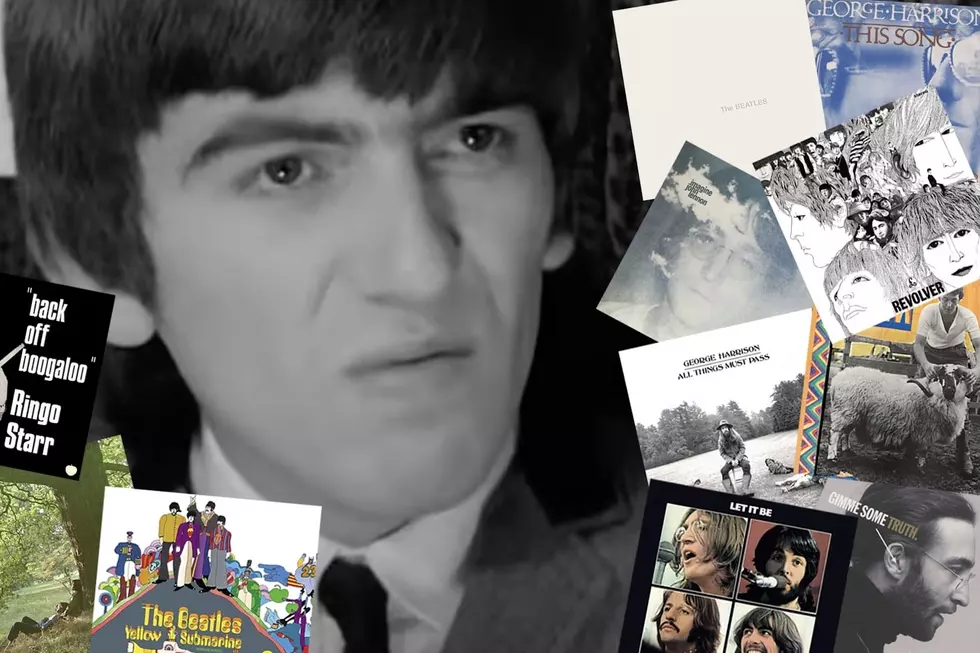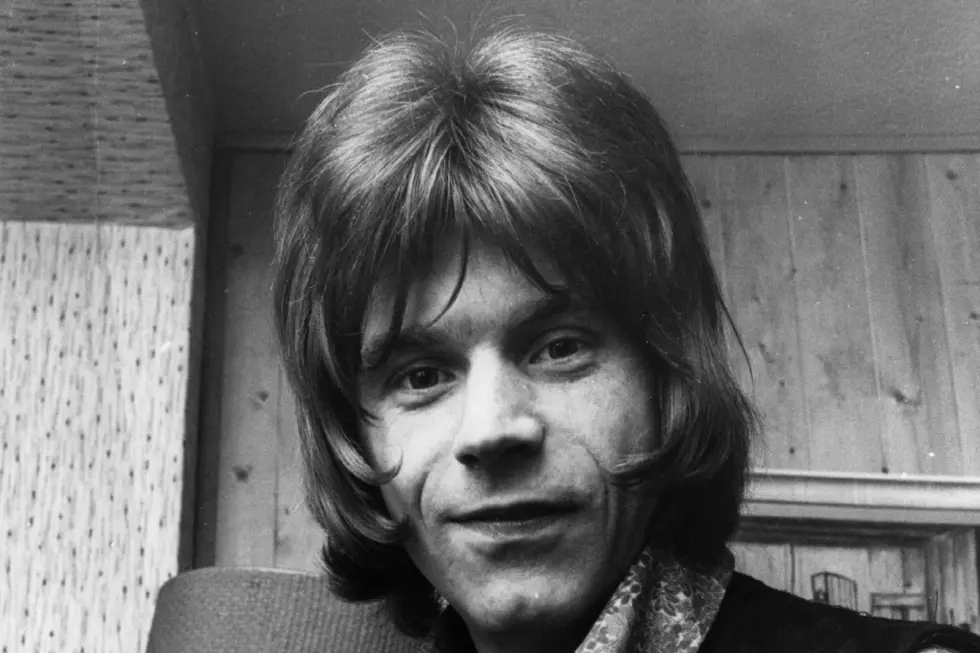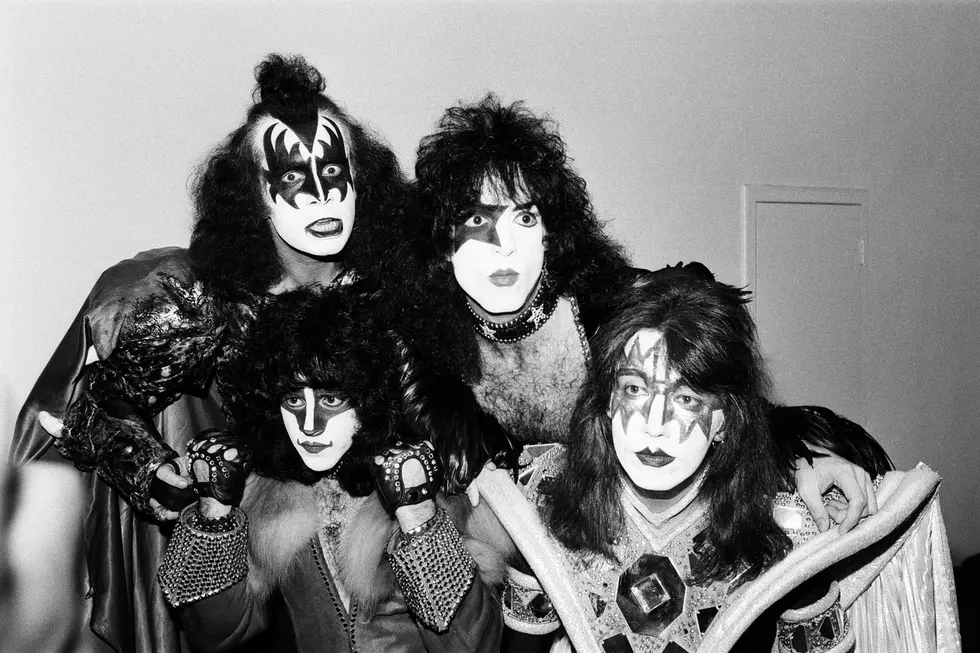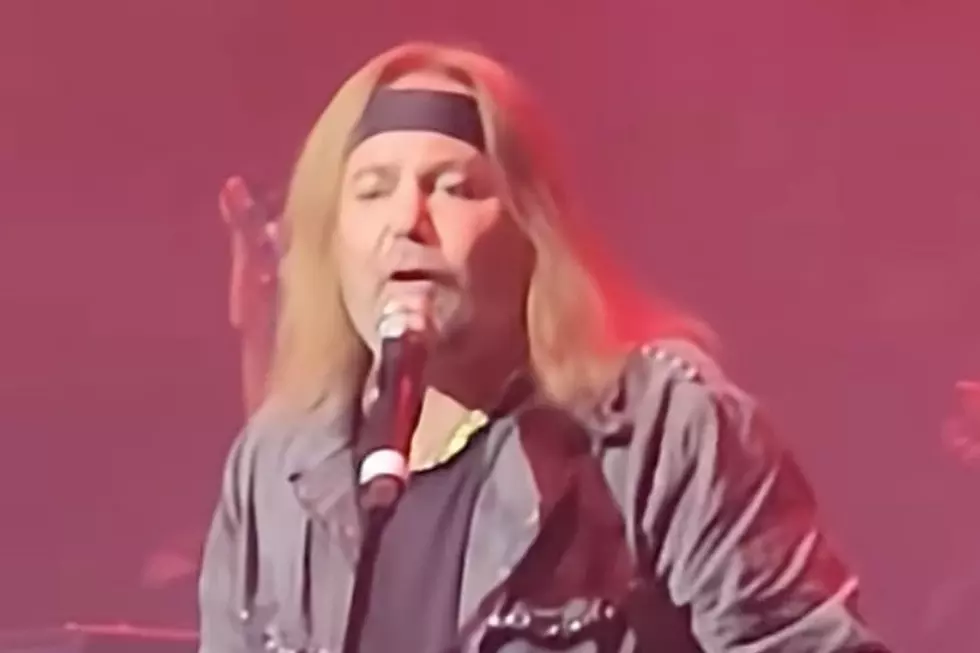
20 Beatles Diss Tracks
The Beatles were not above lobbing potshots at one another, even before they split at the dawn of the '70s. Some of their truths could be remarkably withering.
Notable examples of friendly fire include Paul McCartney's "Too Many People," George Harrison's "Not Guilty" and John Lennon's "How Do You Sleep?" In fact, following their breakup, the Beatles' in-fighting worsened to the point that unrelated songs were commonly misconstrued to be about their feud.
For instance, "3 Legs" from McCartney's 1971 album Ram certainly seemed to be about the others – but the song was actually inspired by a drawing of a friendly canine drawn by daughter Heather. McCartney's original demo had been titled "A Dog Is Here."
READ MORE: Top 10 Beatles Guitar Solos Not By George Harrison
The Beatles also took aim at a host of other worthy targets. The following list of 20 Beatles Diss Tracks focuses on corrupt politicians, cash-focused corporations, egomaniacs, the judicial system and even a contemporary or two.
If there is a definitive through line, it's that the seemingly peaceable Krishna-chanting Harrison was always good for a nasty takedown. He offered some memorable swipes at his bandmates as he tried to breakthrough the Lennon-McCartney logjam, but Harrison also lobbed heavy criticism toward the greedy and simply wrongheaded.
Here's a look back at 20 Beatles Diss Tracks:
No. 20. "Only a Northern Song"
From: The Beatles, Yellow Submarine (1969)
Target: The unscrupulous music industry
Still just a teen, Harrison was conned into signing with Dick James' newly formed Northern Songs. Harrison had no ownership in the company. "I thought, 'Great, somebody's gonna publish my songs!'" Harrison later told Billboard. "But he never said, 'And incidentally, when you sign this document here, you're assigning me the ownership of the songs,' which is what it is. It was just a blatant theft." After Harrison came into his own as a songwriter, he offered this sharp jab during the Sgt. Pepper's Lonely Hearts Club Band sessions.
Key Lines: "It doesn't really matter what chords I play, what words I say or time of day it is – as it's only a northern song."
No. 19. "Dear Friend"
From: Paul McCartney, Wild Life (1971)
Target: John Lennon
John Lennon came out swinging as the Beatles split, memorably describing 1970's McCartney as "rubbish" in Rolling Stone magazine. "I was sort of answering him here, asking, 'Does it need to be this hurtful?'" McCartney said in The Lyrics: 1956 to the Present. "It could have been called 'What the F---, Man?' but I'm not sure we could have gotten away with that then." Of course, McCartney was hardly above the fray: There's an image of two beetles copulating on the back cover of Ram, released earlier this same year.
Key Lines: "Dear friend, what's the time? Is this really the borderline? Does it really mean so much to you? Are you afraid, or is it true?"
No. 18. "This Song"
From: George Harrison, Thirty-Three and a Third (1976)
Target: Dim-witted judicial system
Harrison had just spent a week unsuccessfully testifying that his No. 1 single "My Sweet Lord" hadn't ripped off Bright Tunes Music, publisher of "He's So Fine" by the Chiffons. A judge ruled against Harrison, charging him with the rather novel offense of subconscious plagiarism. "I wrote 'This Song' as a bit of light comedy relief," Harrison wrote in I Me Mine, "and as a way to exorcize the paranoia about songwriting that had started to build up in me." Harrison then returned to court to film the impish accompanying video.
Key Lines: "This tune has nothing bright about it. This tune ain't bad or good and come ever what may, my expert tells me it's okay."
No. 17. "Piggies"
From: The Beatles, The Beatles (1968)
Target: Greedy businessmen
This acid-tongued song dates to the same period in which Harrison wrote "Taxman," found later in our list of Beatles Diss Tracks. Because of a slur that later came into wide use, many thought he was criticizing law enforcement. (One of them was the deranged mass-murderer Charles Manson.) Instead, Harrison was criticizing materialism and class warfare. "Piggies" had "absolutely nothing to do with American policemen," he confirmed in George Harrison on George Harrison. "It was a social comment."
Key Lines: "In their styes with all their backing, they don't care what goes on around. In their eyes, there's something lacking. What they need's a damn good whacking."
No. 16. "Steel and Glass"
From: John Lennon, Walls and Bridges (1974)
Target: Corrupt former manager?
Late-era manager Allen Klein had more to do with the Beatles' breakup than the wrongly accused Yoko Ono. McCartney bitterly opposed hiring him and that led to a band-shattering lawsuit. Lennon's trust was such that he handed over his personal finances to Klein, as well. Their relationship had soured by the time Lennon seethed through "Steel and Glass." Still, he was cagey about its subject matter. "I would sooner everybody think, 'Who's it about?' and try and piece it together," he later admitted. "For sure, it isn't about Paul."
Key Lines: "There you stand with your L.A. tan, and your New York walk and your New York talk ... Well, your teeth are clean but your mind is capped. You leave your smell like an alley cat."
No. 15. "Wah-Wah"
From: George Harrison, All Things Must Pass (1970)
Target: Lennon and McCartney
Harrison began "Wah Wah" in a flood of emotion after he briefly quit during the drawn-out sessions that would eventually produce 1970's Let It Be. "It never came to blows but I thought, 'What's the point of this?'" Harrison admitted in Anthology. "I got up and I thought, 'I'm not doing this any more. I'm out of here.' So I got my guitar and went home and that afternoon wrote 'Wah-Wah.'" It would become the first song recorded during full-band sessions in May 1970 for his solo career-defining All Things Must Pass.
Key Lines: "And I'm thinking of you and all the things that we used to do ... and I know how sweet life can be, if I keep myself free."
No. 14. "Sexy Sadie"
From: The Beatles, The Beatles (1968)
Target: A lecherous spiritual mentor
Lennon was still on a failed quest for transcendentalism with the Maharishi Mahesh Yogi in India when he began composing "Sexy Sadie." A never-proven rumor had spread that their spiritual guide made a pass at one of Lennon's fellow travelers. McCartney tried to persuade Lennon to stay, but he insisted on calling a taxi. Later, Lennon said he wished the resulting lyric had been even more pointed: "I copped out," Lennon told Rolling Stone, "and I wouldn't write 'Maharishi, what have you done? You made a fool of everyone.'"
Key Lines: "One sunny day the world was waiting for a lover. She came along and turned on everyone ... Sexy Sadie, you'll get yours yet – however big you think you are."
No. 13. "Sue Me Sue You Blues"
From: George Harrison, Living in the Material World (1973)
Target: Lennon and McCartney
The Beatles were suing one another. Bright Tunes was suing Harrison. There were also legal entanglements surrounding the Concert for Bangladesh that would keep the majority of the funds tied up for years. The result was "Sue Me Sue You Blues." "I wrote it during the big suing period and it's vaguely based on the square dfance type of fiddle lyric: 'You serve me and I'll serve you; wwing your partners all get screwed," Harrison wrote in I Me Mine. The song title actually popped out of Harrison's mouth during a 1971 appearance on TV's Dick Cavett Show.
Key Lines: "It's affidavit-swearing time, sign it on the dotted line. Hold your Bible in your hand – now all that's left is to find yourself a new band."
No. 12. "She Said She Said"
From: The Beatles, Revolver (1966)
Target: Stoned Peter Fonda
On a break from their U.S. summer tour in 1965, the Beatles hosted a party at a rented house on Mulholland Drive in Los Angeles. It quickly became a scene as acid was passed around. Among those who drifted in was Peter Fonda, who hadn't yet risen to fame with 1969's Easy Rider. He "kept coming over, wearing shades, saying, 'I know what it’s like to be dead' and we kept leaving him because he was so boring!" Lennon said in David Scheff's All We Are Saying. "Don't tell me about it! I don't want to know what it's like to be dead!"
Key Lines: "She said, 'I know what it's like to be dead. I know what it is to be sad.' And she's making me feel like I've never been born."
No. 11. "Back Off Boogaloo"
From: Ringo Starr, Blast from Your Past (1975)
Target: Paul McCartney
Starr said the title of this glam-rock-y single, co-written with Harrison, was inspired by a catchphrase from the equally glam-rock-y Marc Bolan of T. Rex. Elsewhere, "Back Off Boogaloo" seems to be taking aim at McCartney as Starr makes several not-so-veiled references at his early solo career stumbles. Starr had come roaring into the '70s with the gold-selling international Top 5 hit "It Don't Come Easy" while both of McCartney's 1971 albums had been widely panned. (Ram later earned a deserved critical reevaluation.)
Key Lines: "I gotta flash right from the start ... Get yourself together now and give me somethin' tasty. Everything you try to do, you know it sure sounds wasted."
No. 10. "I Me Mine"
From: The Beatles, Let It Be (1970)
Target: Selfish people
The last '60s-era song completed by the Beatles was inspired by thoughts about ego and selfcenterness during one of Harrison's experiments with LSD. Of course, he found himself awash in very similar personality conflicts during sessions for Let It Be, as made clear by the way Harrison is heard introducing the song in the accompanying documentary film: "'I Me Mine,' it's called. I don't care if you don't want it." The completed track provides its own context for these times: Lennon doesn't appear since he'd already left the band.
Key Lines: "No one's frightened of playing it, everyone's saying it – flowing more freely than wine. All through your life: I me mine."
No. 9. "And Your Bird Can Sing"
From: The Beatles, Revolver (1966)
Target: The Rolling Stones
Maybe Lennon initially deemed the Rolling Stones rank copyists because they broke out with a cover of "I Wanna Be Your Man." His lyrics can be Bob Dylan-esque in their stubborn refusal to make sense, but the "bird" in question seems to be their long-time confederate Marianne Faithfull. Like many Beatles songs, Lennon was later quite dismissive of "And Your Bird Can Sing." Still, the fleet twin guitars from McCartney and Harrison were cool enough to warrant usage as the theme for the late-'60s Beatles cartoon.
Key Lines: "You tell me that you've got everything you want, and your bird can sing – but you don't get me. You don't get me."
No. 8. "Run of the Mill"
From: George Harrison, All Things Must Pass (1970)
Target: Paul McCartney
Another song from Harrison's brief Let It Be-era hiatus from the Beatles – and a personal early favorite. His songwriting was growing by leaps and bounds: "It was the first song I ever wrote that looked like a poem on paper, whereas most of them don't seem much until you put the lyric with the tune," Harrison acknowledged in I Me Mine. "Run of the Mill" is the sound someone taking responsibility for their own destiny. Even if all else had remained the same, Harrison wouldn't have been with the Beatles much longer.
Key Lines: "Though I'm beside you, I can't carry the blame for you. I may decide to get out with your blessing, where I'll carry on guessing."
No. 7. "Glass Onion"
From: The Beatles, The Beatles (1968)
Target: Rumor-mongering Beatles fans
Lyric-studying sleuths had been combing through Beatles lyrics for years, looking for hidden meanings. And that was before reports of McCartney's death and replacement began running rampant. Lennon responded with a jugsaw puzzle of a song with enough non sequiturs, song callbacks, narrative blind-alleys and inside jokes to keep everyone busy for years. He even reveals the true identity of the Walrus. Well, not really: "I threw the line in," he admitted in All We Are Saying, "just to confuse everybody a bit more."
Key Lines: "I told you about the walrus and me, man. You know that we're as close as can be, man. Well, here's another clue for you all – the walrus was Paul."
No. 6. "Taxman"
From: The Beatles, Revolver (1966)
Target: The British government
The Beatles had made it – then Harrison made a terrible discovery: They were paying 19-and-a-half shillings to the British government for every 20 they made. "You are so happy that you've finally started earning money – and then you find out about tax," Harrison said in the Anthology series. "With supertax and surtax and tax-tax, it was ridiculous – a heavy penalty to pay for making money." Lennon made a lyrical assist then McCartney took a scorching turn on guitar as Harrison completed his first-ever album-opening song.
Key Lines: "If you try to sit, I'll tax your seat. If you get too cold, I'll tax the heat. If you take a walk, I'll tax your feet – 'cause I'm the taxman."
No. 5. "God"
From: John Lennon, Plastic Ono Band (1970)
Target: Everything but Yoko Ono
Lennon's first proper solo album slowly built toward this towering statement of purpose. "God" found him turned his back on everything that came before (his parents, religion, key influences, his old band) – except Yoko Ono. "I don't know when I realized I was putting down all these things I didn’t believe in," he said in Lennon Remembers. "I could have gone on. It was like a Christmas card list – where do I end?" Turns out, it was with the Beatles. As Lennon said goodbye, the '60s came to a definitive end.
Key Lines: "I don't believe in Jesus, I don't believe in Kennedy ... I don't believe in Elvis. I don't believe in Zimmerman. I don't believe in Beatles. I just believe in me – Yoko and me."
No. 4. "Not Guilty"
From: George Harrison, George Harrison (1979)
Target: Lennon and McCartney
Harrison complained about the deteriorating relationships inside the Beatles on several songs like "Wah-Wah" and "Run of the Mill" that later appeared on solo albums. "Not Guilty" did too, but Harrison wasn't shy about bringing up these frustrations in front of the others: The Beatles actually ran through a grungy version of "Not Guilty" that was released as part of the Anthology series, setting fire to Harrison's spare original demo. The song wouldn't see its first official release, however, until the end of the '70s.
Key Lines: "No use handing me a writ while I'm trying to do my bit ... I won't upset the apple cart. I only want what I can get."
No. 3. "Gimme Some Truth"
From: John Lennon, Imagine (1971)
Target: President Richard Nixon
Lennon began this song when he was still put out with the Maharishi, who Lennon believed had been preying on attendees at a transcendental meditation retreat. The Beatles also worked on "Gimme Some Truth" during the Let It Be era. By the time Lennon finished it for Imagine, he had a new scoundrel to vilify: Richard Nixon. Unfortunately for Lennon, that made him a target – particularly because this kicked off a period of increased activism. He was nearly deported before belatedly securing a green card – some five years later.
Key Line: "I've had enough of reading things by neurotic, psychotic, pig-headed politicians. All I want is the truth. Just give me some truth."
No. 2. "Too Many People"
From: Paul McCartney, Ram (1971)
Target: John Lennon
McCartney hadn't yet endured Lennon's most damaging post-breakup blow, found atop this list of 20 Beatles Diss Tracks. But he'd heard enough to feel like a response was warranted. "John was firing missiles at me with his songs, and one or two of them were quite cruel," McCartney said in The Lyrics: 1956 to the Present. "I decided to turn my missiles on him too, but I'm not really that kind of a writer, so it was quite veiled." Lennon heard every reference loud and clear. He'd answer later the same year on Imagine.
Key Lines: "That was your first mistake: You took your lucky break and broke it in two. Now what can be done for you? You broke it in two."
No. 1. "How Do You Sleep?"
From: John Lennon, Imagine (1971)
Target: Paul McCartney
There was nothing veiled about "How Do You Sleep?" Lennon utterly dismissed McCartney's songwriting contributions, calling his work "muzak to my ears," before turning the knife with a reference to the "Paul is Dead" rumors. (His original lyrics are somehow even more caustic.) "There were a few little digs on his albums," Lennon admitted in David Sheff's All We Are Saying. "So I just thought, 'Well, hang up being obscure! I'll just get right down to the nitty-gritty.'" Mission accomplished.
Key Lines: "Those freaks was right when they said you was dead. ... The only thing you done was yesterday and since you're gone, you're just another day."
Rock Music's 25 Craziest Conspiracy Theories
Gallery Credit: Nick DeRiso
Why the Beatles Hated One of Their Own LPs
More From Ultimate Classic Rock









